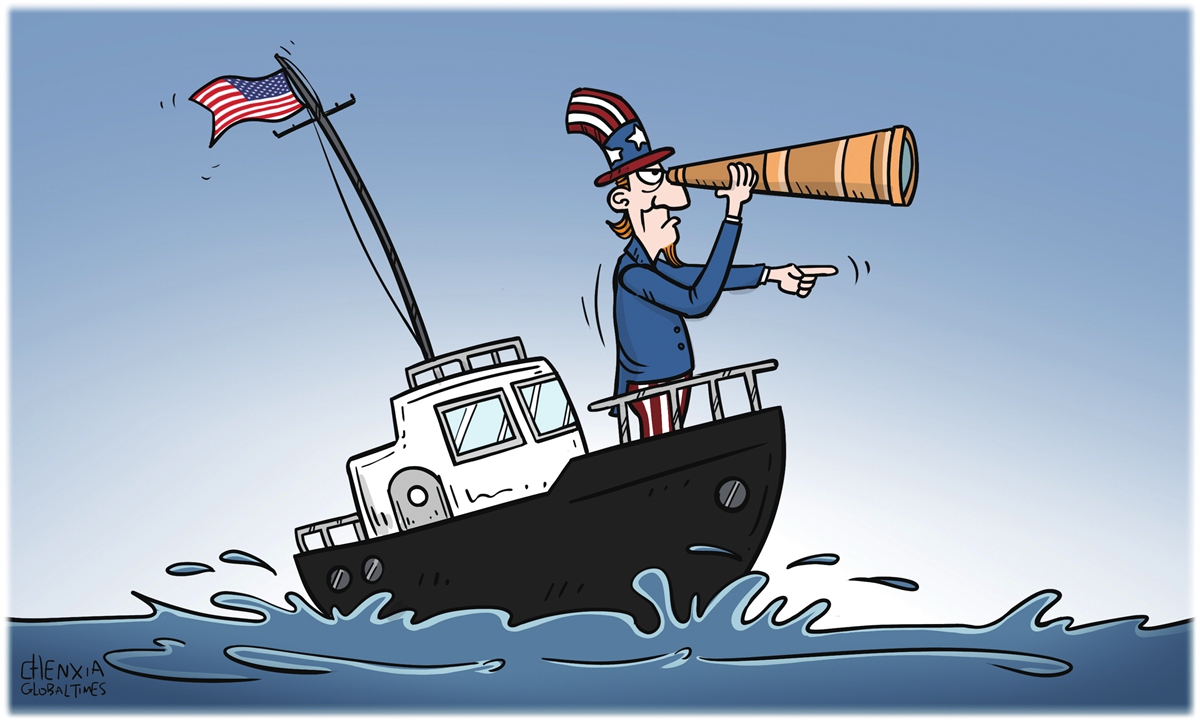
Illustration: Chen Xia/GT
A Forbes article on Sunday noted that while the world is "distracted by Russia," China is taking the opportunity to "violate" its neighbors' sovereignty. It then hyped Beijing's "violations" of Manila's sovereign rights in the South China Sea (SCS), claiming that China intends to "spy on a US-Philippine military exercise."From a US military official claiming China has "militarized" at least three islands in the SCS, to attempts to incite the dispute between China and the Philippines, some voices in the US are groundlessly misrepresenting China's actions in the region. Many of Beijing's moves in the SCS, like having vessels patrol islands and reefs, are in fact defensive. These necessary measures have little to do with the timing of the Russia-Ukraine conflict.
Driven by the need to safeguard its sovereignty, China has always been conducting law enforcement in its surrounding waters, and currently, there is no sign of a large increase in such actions. Linking China's legitimate actions in the SCS to the ongoing Russia-Ukraine conflict is a deliberate attempt to instigate panic in the region. This is also a way for Washington to take advantage of public opinion to further increase its presence in the Indo-Pacific region.
Speaking of military exercises, the US and the Philippines started "their biggest military drills in three decades" on Monday. Over the past year, the US has steadily increased its military presence in the region. In 2021, the US military conducted at least 95 exercises in and near the SCS, according to a report released Sunday by a Chinese think tank. Among the exercises, US aircraft carrier strike groups and amphibious-ready groups entered the region 12 times, more than doubling the activities of 2020.
As the Biden administration concentrates more on the Indo-Pacific region, Washington will certainly continue to enhance its military ambitions around China. On one hand, this is a necessary step for Washington to consolidate its global hegemony. On the other, it is trying to drive a wedge between China and its neighboring countries.
Most regional countries have chosen to adopt balanced diplomacy between China and the US without taking sides. They don't want the US to push China too hard and let Washington lead them by the nose. They also don't want the US to withdraw from the region completely.
However, judging from recent events like the indefinite postponement of the US-ASEAN summit, it is obvious that some regional countries are not particularly interested in some of the US' actions. Some may not want to get too close to Washington.
The escalation of the Ukraine crisis revealed that the US has been playing the role of a disruptor in Europe. Now it seems Washington is trying to replicate this model in China's neighborhood, but it will face obstacles here.
Due to the existence of NATO, a well-developed and complete alliance system, the US' European allies can play a leading role in coping with various crises. But there is no such alliance in the Indo-Pacific region. Moreover, regional countries usually choose to maintain a balance between China and the US. Thus, on many occasions, Washington has to take the initiative to stir up troubles in the region by itself.
Washington is attempting to provoke China's neighbors and intensify regional conflicts. Regional conflict could escalate under at least one possible scenario - the outbreak of direct conflict between China and the US. However, there are plenty of communication mechanisms between the two countries to prevent miscalculation from both sides and an escalation of conflict.
While the US has no willingness to directly engage in conflict with China, it hopes to pressure surrounding countries to confront it. In Southeast Asia, the Philippines and Vietnam are the ones most likely to be coerced because of their relatively serious disputes with China. But both countries are quite cautious about being US pawns, as they prefer to maintain a balance between Beijing and Washington. Thus, they are unlikely to become vanguards of the US' offensive against China. Overall, the risk of the escalation of a regional conflict can still be managed.
The author is research fellow and deputy director at the Institute of International Relations of the Shanghai Academy of Social Sciences. opinion@globaltimes.com.cn

